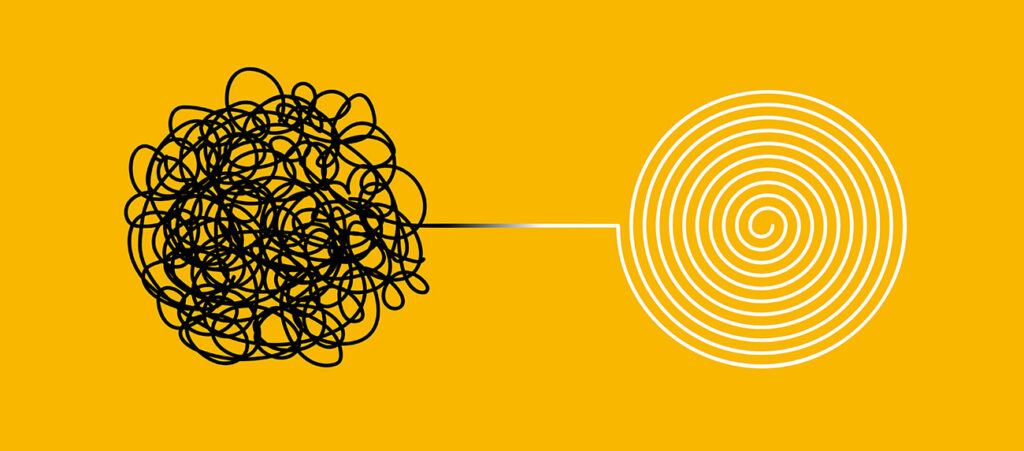Does trying to wash your dog, take out the trash, load the dishwasher, fold your clothes, and re-organize your fridge in between the original task of running upstairs for a charger sound familiar to you?
Have you ever told a story and by the time you finished you’ve already fully explained the back story to every person involved in the story?
Have you been fired from multiple jobs?
Have you ever been called immature and impulsive?
Do you struggle to finish a big task?
Did you struggle to finish reading just this first paragraph because you already had to reread the same line for the fourth time after getting distracted?
If so, then you could possibly have ADHD. But first, let’s talk further about what ADHD is.
Defining ADHD
ADHD is one of the most common neurodivergent disorders that occur in childhood and continues into adulthood. It can be presented in more than one way. The DSM-5 breaks it down into three different types of presentation.
These types are:
- Predominantly Inattentive
- Predominantly Hyperactive-Impulsive
- Combined
Predominantly Inattentive
A person with the inattentive type may struggle to maintain attention and focus throughout an entire class period. They may have difficulty following instructions after only being told once.
They also may have to be reminded of their daily routine multiple times at home or at school. It is common for someone with this type of ADHD to have to re-read questions or lines multiple times in order to fully comprehend.
If you catch them daydreaming, or zoning out often, do not be alarmed! They often get caught up in their thoughts. They struggle to finish the task they start even if they had the best intentions initially. People often mistake them with being absent minded or uninterested.
Predominantly Hyperactive-Impulsive
A person struggling with the hyperactive-impulsive type struggles to sit still for long and short periods of time. They will be seen fidgeting, moving, and pacing a lot.
They struggle to wait their turn, causing many interruptions and blurting. They tend to make impulsive decisions without fully thinking it through. Many mistake them for being inconsiderate, or rude.
Combined
The more common of the types is the Combined Presentation Type. Someone with the combined type will have symptoms of both areas.
While this disorder is normally diagnosed within childhood, there have been more and more cases of adults being diagnosed. It is important to note that ADHD can look different from person to person.
Men and women present the symptoms differently from one another. Children and adults also may present the symptoms differently. The most important fact is noting that just because you are easily distracted, or may struggle with waiting in line does not mean an automatic diagnosis.
The DSM-5 states that these symptoms must occur in more than one setting, and must also significantly interfere with school, work, or social functioning.
About 80% of those who have ADHD may also have what is called a comorbid diagnosis. Comorbidity occurs when a person has more than one diagnosis. Some common diagnoses that often occur within those who have ADHD are depression, anxiety, sensory processing disorder, and oppositional defiant disorder.
It is important to take into account that ADHD can affect different people in different ways depending on age, gender, and diagnosis type. People outwardly express their frustrations with ADHD differently as well.
Some may suffer from low self-esteem, lack of impulse control, and oppositional behaviors. Knowing and understanding your diagnosis is vital in order to be able to properly manage it.
ADHD Treatment
The main methods of treatment for ADHD are medication and psychotherapy. While medication can be a good option for those who may need it, there are many different non-medical interventions that one can utilize to manage ADHD.
A few of these interventions can include managing diet, incorporating exercise into daily routine, meditation, natural supplementation, and psychotherapy or ADHD coaching.
Can ADHD go away?
It is possible to “outgrow” ADHD, although typically once diagnosed, people will generally be affected throughout their life. However, the good news is that symptoms can be more easily managed over time, and it is possible to live a successful life even with an ADHD diagnosis.
The more one learns about their diagnoses and the unique strategies that best help their brain and symptoms, the more a person can feel in control of their life and impulses.
Effective Therapy for ADHD
As time continues to pass, more and more studies are being done on ADHD. What was once a “mythical diagnosis” is now becoming known and understood all over the world. As more research becomes available, the strategies used to manage this disorder also increase and become more effective.
Staying up to date with new research and methods for treatment increases the chance of finding ways to live a full and balanced life. Here are some of the preferred therapy methods for treating ADHD.
Psychoeducation:
How can one effectively manage their disorder if they don’t fully understand what that disorder is? Learning and understanding how your neurodivergent brain works is the first step to managing ADHD. At Fava Counseling Associates, we will work with you to increase your knowledge on ADHD along with different methods to counteract unproductive habits.
ADHD Coaching:
ADHD coaching is a coaching approach that is specific to the areas that you are struggling with individually. You will learn thorough techniques that will help you gain more confidence and decrease anxiety. ADHD coaching techniques can be specific to home life, work, relationships, executive functioning, friendships, parenthood, and more!
DBT Skills:
Becoming more emotionally cognitive, will further enhance your ability to communicate effectively. With ADHD it is easy to get lost in your thoughts or fears. DBT skills such as mindfulness, interpersonal effectiveness, and emotional regulation all can assist with thought regulation. More and more adults with ADHD are leaning into the principles of DBT to naturally treat their symptoms.
Medication
Medication is a very effective form of treatment with ADHD, and is most often prescribed by a Psychiatrist or Psychiatric Nurse Practitioner. However, it is not the only effective form of treatment. If one does not desire to go down the path of medication, then the above methods of treatment are only just a few examples of how we can help you!
Our ADHD Approach:
At Fava Counseling Associates of Atlanta, our therapists can help you understand your unique symptoms, and can provide assistance with coaching and developing skills that can better help you work with your brain and how it’s wired.
Our Atlanta therapists are trained in DBT, CBT and mindfulness, all which are effective treatment methods for ADHD.
We also stay up to date on the latest research to be able to provide relevant psychoeducation to our ADHD clients. We can make referrals to other professionals in the community if we believe that a formal evaluation or medication is needed.
We also can support you in processing the challenges that come from struggling with ADHD symptoms. Through a mix of psychotherapy sessions, coaching, and even parenting support groups, we can help make sure that the whole family has the tools needed to support a loved one who may be struggling to deal with ADHD.
If you or someone you know could possibly have an ADHD diagnosis, and would like to learn more, click here to schedule your free consultation call with our office manager, or with one of our Atlanta ADHD counselors.





